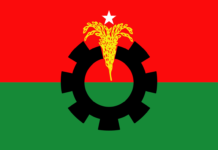Sadeq Khan
At the height of the opposition 18-party alliance’s progressively increasing bouts of 60 hour, 72 hour, and 144 hours of highway, waterway and railway blockades accompanied by sporadic hartals countrywide or locally enforced over the last three working weeks, the embattled Prime Minister Sheikh Hasina’s election-time revamped mahajote government appears to be deliberately provoking and inviting wrath of the opposition activists, particularly of the Jamat-Shibir camp.
The purpose could be to drive the Jamat-Shibir activists to such senseless fury as might prompt them to anarchic conduct and acts of violence and sabotage that could patently serve as justification to declare a state of emergency and call the army to restore order. Or else, it could be that on receiving a strongly worded letter on December 10 from the UN High Commissioner for Human Rights Navi Pillay for an eleventh-hour stay of execution for Abdul Quader Mollah, the Jamat politician convicted of war crimes “in a trial that did not meet international standards for imposition of the death penalty,” the government decided to hurriedly execute the warrant of death by hanging of the Jamat leader Mollah that very day past midnight.
Mollah was verbally asked by two special magistrates of the government whether he would prefer a mercy petition to the President, and it was claimed by the government he answered in the negative. Without keeping any signed statement of the condemned man that he would not pray for mercy, the prison authorities proceeded to bathe him, gave him his last meal, and at his request supplied him with a holy Quran to read. He was saved from the gallows that night only by a last-minute service by his defence lawyers of a stay order from the chamber judge of the Supreme Court pending hearing next day of a petition for review of the death verdict of Mollah by the Appellate Division.
Mistaken identity
The defence had always contended with little success at the trial court that Mollah was innocent and a victim of mistaken identity for crimes committed by Kasai Kader, an entirely different person who is no more. It was therefore a mistrial. The defence also contended that the draconian domestic law under which Mollah was found guilty of Kasai Kader’s crimes was neither in conformity with the standards of international law for war crimes or crimes against humanity, nor cognizant of the fair provisions of the Evidence Act applicable in all cases under the Code of Criminal Procedure. The Tribunal trying Mollah therefore adjudicated on hearsay evidence and ignored the plea of mistaken identity. Even then, and despite other lapses of trial procedure poised against the defence, on February 5, 2013 Mollah was sentenced to life in prison by the International Crimes Tribunal (ICT), the domestic court holding trials for the atrocities in Bangladesh’s 1971 war of liberation from Pakistan.
Mollah’s family and friends claimed that insiders of Sheikh Hasina’s government thereafter, for reasons of political capital, staged large month long public protests demanding the death sentence for Mollah, in response to which the government passed amendments to the ICT law on February 17, allowing the prosecution to appeal the sentence. Until the Mollah case, the prosecution was only allowed to appeal if the accused was acquitted. On September 17, the Appellate Division of the Supreme Court reversed the life sentence on Mollah and imposed the death penalty for murder and rape as crimes against humanity. The International Covenant on Civil and Political Rights (ICCPR), to which Bangladesh is a state party, prohibits the retroactive application of criminal law that has a negative effect on the defense.
On December 11, when the Appellate Division sat to hear the admissibility of the petition for review of the conviction earlier decreed by them against Mollah, the prosecution again argued that the draconian law under which Mollah was prosecuted was made part of the Constitution and superseded other laws and practices of fair trial applicable in criminal cases. That argument has been accepted by the judges at the conclusion of the hearing on December 12. Mollah now is again waiting to be sent to the gallows, after a final meeting, if allowed, as requested by his immediate family members.
UNHCHR requests stay
The letter to the Prime Minister seeking stay of execution for Abdul Quader Mollah sent on December 10 by the UN Office of the High Commissioner for Human Rights (OHCHR) follows a OHCHR statement last month, in which the High Commissioner urged the Bangladeshi Government not to proceed with the death penalty in cases before the International Crimes Tribunal, particularly given concerns about the fairness of the trials.
The UN Special Rapporteur on the independence of judges and lawyers has also called for the execution to be stayed, amid concerns that Mr. Mollah did not receive a fair trial.
Meanwhile tensions all around the country are running sky high after the news of rejection of the review request of the trial and conviction of Mollah by the Supreme Court. On the last day of the 144 hour blockade and dawn-to-dusk hartal, body counts are rising under direct police firing aimed at victims, as are cases of arson attacks and cocktail bomb explosions in some Awami League politicians’ and some judges’ country homes and houses, apart from other incidents of clashes, deaths and injuries.
Meanwhile, Dhaka intelligentsia as well as the ill-affected business community are feeling despondent at the perceived if not publicly-acknowledged failure of the UN Secretary General’s envoy Oscar Fernandez Taranco is obtaining any concrete result from his 6-day Dhaka visit and mediation between the two major parties in the power game in Bangladesh.
Crossing the Rubicon
The Prime Minister was successful in fending off Taranco’s bids for postponement of the election schedule to facilitate a compromise formula for free, fair and faithful general election with the participation of all major parties. She had gone on using the time she kept the opposition and some of her own party men busy talking and racking their brains, only to carry on obstinately, as some opposition leaders are now alleging, with her scheme for a unilateral polling exercise to obtain nominal stamp of legitimacy on a virtually one-party parliament she wants to be returned to power.
She denied Taranco the courtesy of scheduled audience before departure, and appears to have told off the UN Security General and the US Foreign Secretary, both of whom phoned her before the end of Taranco mission, that she is proceeding with scheduled elections as per Constitutional provisions that stand amended unilaterally by her Treasury Bench, and that she would be able to peacefully obtain the transition of power. Both the distinguished callers wished her good luck, as they would as diplomatically appropriate. But will she indeed be able to cross the Rubicon of power transition, with the country in doldrums as it is? Many suggest that Sheikh Hasina’s desperate brinkmanship for a royal flush is more likely come to nought notwithstanding the bravado of her public posture.
Source: Weekly Holiday










